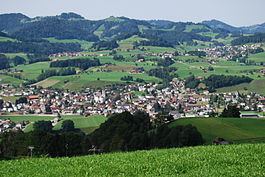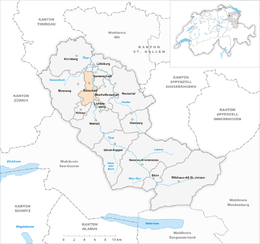Bütschwil
| Bütschwil | |
|---|---|
| Former municipality of Switzerland | |
 |
|
| Coordinates: 47°21′N 9°4′E / 47.350°N 9.067°ECoordinates: 47°21′N 9°4′E / 47.350°N 9.067°E | |
| Country | Switzerland |
| Canton | St. Gallen |
| District | Toggenburg |
| Government | |
| • Mayor | Karl Brändle |
| Area | |
| • Total | 13.79 km2 (5.32 sq mi) |
| Elevation | 610 m (2,000 ft) |
| Highest elevation (Sedelberg) | 942 m (3,091 ft) |
| Lowest elevation (Thur River) | 555 m (1,821 ft) |
| Population (Dec 2011) | |
| • Total | 3,365 |
| • Density | 240/km2 (630/sq mi) |
| Postal code | 9606 |
| SFOS number | 3391 |
| Surrounded by | Ganterschwil, Krinau, Lichtensteig, Lütisburg, Mosnang, Oberhelfenschwil, Wattwil |
| Website |
www SFSO statistics |
Bütschwil is a former municipality in the Wahlkreis (constituency) of Toggenburg in the canton of St. Gallen in Switzerland. On 1 January 2013 the former municipalities of Bütschwil and Ganterschwil merged to form the new municipality of Bütschwil-Ganterschwil.
Bütschwil is first mentioned in 779 as Bucinesvilare.
Bütschwil had an area, as of 2006[update], of 13.7 km2 (5.3 sq mi). Of this area, 66.3% is used for agricultural purposes, while 19.8% is forested. Of the rest of the land, 12.4% is settled (buildings or roads) and the remainder (1.5%) is non-productive (rivers or lakes).
The former municipality is located in the Toggenburg Wahlkreis along the Thur river. On the left bank of the Thur, it consists of the linear villages of Bütschwil and Dietfurt and the hamlets of Grämigen, Tierhag, Feld, Kengelbach and Zwiselen. While on the right bank are the hamlets of Langensteig and Laufen.
The blazon of the municipal coat of arms is Gules, two Swans' Heads proper couped and interwoven.
Bütschwil had a population (as of 2011) of 3,365. As of 2007[update], about 15.7% of the population was made up of foreign nationals. Of the foreign population, (as of 2000[update]), 28 are from Germany, 83 are from Italy, 318 are from ex-Yugoslavia, 5 are from Austria, 165 are from Turkey, and 65 are from another country. Over the last 10 years the population has decreased at a rate of -7.2%. Most of the population (as of 2000[update]) speaks German (88.2%), with Albanian being second most common ( 3.6%) and Serbo-Croatian being third ( 1.8%). Of the Swiss national languages (as of 2000[update]), 3,131 speak German, 5 people speak French, 62 people speak Italian, and 2 people speak Romansh.
...
Wikipedia



